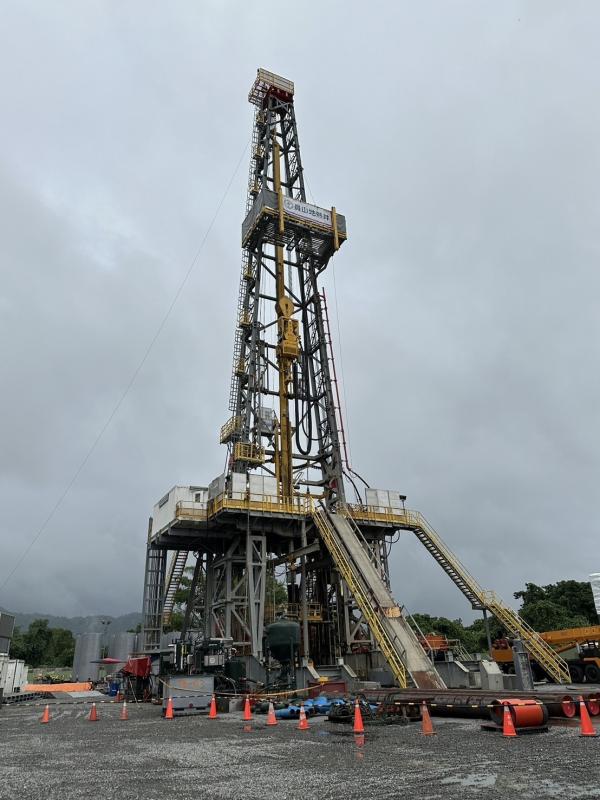Taiwan Power Co (Taipower, 台電) and CPC Corp, Taiwan (CPC, 台灣中油) have formed about 20 teams to conduct geothermal exploration around Taiwan next year, with an aim of generating 1 gigawatt (GW) of geothermal energy by 2028, Vice Minister of Economic Affairs Lien Ching-chang (連錦漳) said on Thursday.
Speaking at a renewable energy summit, Lien said the government would continue to put the utmost effort into promoting sustainable energy, such as wind, geothermal, solar and hydropower.
According to Lien, the government has set an objective of producing sustainable energy to account for 60-70 percent of the country's total power generation in 2050, when the global energy sector is bound to reach net-zero emissions by deploying a wide portfolio of clean energy technologies.

Photo: CNA
To serve that end, some 20 CPC-Taipower teams are poised to kick off a geothermal exploration project across Taiwan next year.
The exploration task followed the drilling of Taiwan's first deep geothermal well in Yilan County's Yuanshan Township (員山) last month, with the work expected to be completed in June next year.
The country's shallow geothermal energy potential is about 1 GW and its deep geothermal energy potential has an estimated high of 40 GW, with the potential to develop 10 GW of geothermal energy, Minister of Economic Affairs J.W. Kuo (郭智輝) said at a ceremony marking the start of the drilling,
According to Lien, Taiwan ranked the world's seventh in terms of offshore wind power installation capacity last year, with a generation capacity surpassing 2 GW, evidenced in that as of August this year, Taiwan had erected 364 wind power plants, with a generation capacity hitting 2.7 GW.
Renewable energy accounted for only 10.5 percent of total electricity generation in the first nine months of this year in Taiwan, up from 9.1 percent during the same period last year, but still far below the government's 20 percent target for next year.

SEEKING CLARITY: Washington should not adopt measures that create uncertainties for ‘existing semiconductor investments,’ TSMC said referring to its US$165 billion in the US Taiwan Semiconductor Manufacturing Co (TSMC, 台積電) told the US that any future tariffs on Taiwanese semiconductors could reduce demand for chips and derail its pledge to increase its investment in Arizona. “New import restrictions could jeopardize current US leadership in the competitive technology industry and create uncertainties for many committed semiconductor capital projects in the US, including TSMC Arizona’s significant investment plan in Phoenix,” the chipmaker wrote in a letter to the US Department of Commerce. TSMC issued the warning in response to a solicitation for comments by the department on a possible tariff on semiconductor imports by US President Donald Trump’s

‘FAILED EXPORT CONTROLS’: Jensen Huang said that Washington should maximize the speed of AI diffusion, because not doing so would give competitors an advantage Nvidia Corp cofounder and chief executive officer Jensen Huang (黃仁勳) yesterday criticized the US government’s restrictions on exports of artificial intelligence (AI) chips to China, saying that the policy was a failure and would only spur China to accelerate AI development. The export controls gave China the spirit, motivation and government support to accelerate AI development, Huang told reporters at the Computex trade show in Taipei. The competition in China is already intense, given its strong software capabilities, extensive technology ecosystems and work efficiency, he said. “All in all, the export controls were a failure. The facts would suggest it,” he said. “The US

The government has launched a three-pronged strategy to attract local and international talent, aiming to position Taiwan as a new global hub following Nvidia Corp’s announcement that it has chosen Taipei as the site of its Taiwan headquarters. Nvidia cofounder and CEO Jensen Huang (黃仁勳) on Monday last week announced during his keynote speech at the Computex trade show in Taipei that the Nvidia Constellation, the company’s planned Taiwan headquarters, would be located in the Beitou-Shilin Technology Park (北投士林科技園區) in Taipei. Huang’s decision to establish a base in Taiwan is “primarily due to Taiwan’s talent pool and its strength in the semiconductor

French President Emmanuel Macron has expressed gratitude to Hon Hai Precision Industry Co (鴻海精密) for its plan to invest approximately 250 million euros (US$278 million) in a joint venture in France focused on the semiconductor and space industries. On his official X account on Tuesday, Macron thanked Hon Hai, also known globally as Foxconn Technology Group (富士康科技集團), for its investment projects announced at Choose France, a flagship economic summit held on Monday to attract foreign investment. In the post, Macron included a GIF displaying the national flag of the Republic of China (Taiwan), as he did for other foreign investors, including China-based